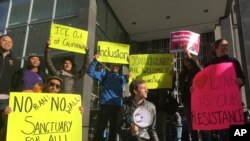U.S. President Donald Trump is assailing judges who made "ridiculous rulings" overturning his executive orders to ban travel from some majority-Muslim countries and to curb funding to American cities that refuse to cooperate with federal immigration officials.
Trump vowed Wednesday to take the adverse decisions to the Supreme Court and attacked the segment of the U.S. judiciary in the western part of the country where the rulings were handed down.
Trump posted his comments on his Twitter account hours after U.S. District Judge William Orrick in California temporarily blocked his executive order threatening to cut off federal funding to local governments that refuse to cooperate with immigration authorities to detain illegal immigrants arrested in criminal cases, often for minor offenses.
"Out of our very big country, with many choices, does everyone notice," Trump said, "that both the 'ban' case and now the 'sanctuary' case is brought in the Ninth Circuit, which has a terrible record of being overturned (close to 80 percent). They used to call this 'judge shopping!' Messy system."
Trump was citing a partial truth, that a large number of decisions reached by the generally liberal appellate judges in the western U.S. judicial district that have subsequently been reviewed by the Supreme Court have been reversed in recent years.
But the country's highest court typically only reviews a tenth of one percent of the rulings made by appellate courts in the U.S. -- about 64 cases a year -- and numerous of those decisions from throughout the country, not just from the western district, have been overturned in recent years. The vast majority of appellate court decisions, 60,000 annually, including those in the western court district, are never reviewed by the Supreme Court.
Even before Trump offered his commentary on Orrick's ruling, the White House sharply criticized it.
“San Francisco, and cities like it, are putting the well-being of criminal aliens before the safety of our citizens, and those city officials who authored these policies have the blood of dead Americans on their hands,” the White House said in a statement late Tuesday.
Orrick's temporary ruling will remain in effect while a lawsuit over a provision in a Trump executive order makes its way through the court system. The January 25 executive order called for federal funding to be withheld from sanctuary jurisdictions, and the judge said the president cannot put new conditions on money already allocated by Congress.
“Federal funding that bears no meaningful relationship to immigration enforcement cannot be threatened merely because a jurisdiction chooses an immigration enforcement strategy of which the president disapproves,'' Orrick said.
The judge was careful to specify that his order does not prevent the Justice Department from enforcing "existing conditions of federal grants."
The White House statement said Orrick’s decision is “yet one more example of egregious overreach by a single, unelected district judge.”
The Trump administration has similarly objected to federal court orders suspending enforcement of the president’s executive orders to halt the nation’s refugee program and prohibit the issuance of new visas to people from a group of majority-Muslim countries. A federal appeals court is due to hear one of those cases next month.
“We are confident we will ultimately prevail in the Supreme Court, just as we will prevail in our lawful efforts to impose immigration restrictions necessary to keep terrorists out of the United States,” the White House said.
The statement further cast the battle as one “between the rule of law and lawlessness, and between hardworking Americans and those who would undermine their safety and freedom."
San Francisco and neighboring Santa Clara County argued that the sanctuary city executive order jeopardized billions of dollars in federal funding.
Lawyers for the Justice Department said the amount of funding was much less and pertained to a specific set of grants.
Last week, U.S. Attorney General Jeff Sessions sent a letter to 10 sanctuary jurisdictions, directing them to submit a letter certifying that they are in compliance with immigration laws. The jurisdictions have until June 30 to respond.
After a meeting with mayors Tuesday, Sessions issued a statement saying that one jurisdiction has already responded. "We will evaluate those responses to ensure the requirements of these grants are met," Sessions said in a statement issued before Orrick's ruling.




